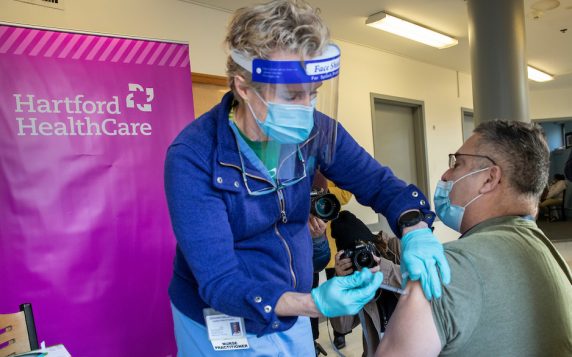Connecticut has one of the nation’s highest rates of the Mu variant, the latest COVID-19 mutation that could prove even more transmissible and more resilient than the now-dominant Delta against current vaccines.
Connecticut, with 73 Mu cases reported as of Saturday, had the fourth-highest proportion of Mu cases after Alaska, Hawaii and Maine. But the cases still represent only about 1 percent of all cases in each state. California reported the most cases of Mu variant over the Labor Day weekend with 384, though that represented only 0.2 percent of all samples sequenced in the state.
Connecticut’s first Mu case was identified March 25. Its most recent case was Aug. 7. (The Delta variant accounts for more than 99 percent of the state’s cases.)
The Mu variant, first identified in Colombia in January, has now spread to 42 countries. The World Health Organization classified it as a variant of interest on Aug. 30 — mutations are categorized as variants of interest, variants of concern and variants of high consequence — as the Centers for Disease Control and Prevention continues to monitor it without a classification.
Some early studies indicate Mu’s multiple mutations could make it more resistant to antibodies produced by current vaccines. It’s transmissibility is still uncertain, but Mu cases quickly accounted for up to one-third of infections in Colombia. In Belgium, 21 vaccinated residents of a nursing home were infected recently with the Mu variant, resulting in seven deaths.
“The changes in the virus may make it able to evade some of our immune defenses but there is no evidence yet that it is more transmissible,” says Dr. Virginia Bieluch, Chief of Infectious Diseases at The Hospital of Central Connecticut in New Britain.
Here are details on Mu cases in Connecticut from Outbreak.info, using data provided by the Global Initiative on Sharing All Influenza Data:

Variants are a disease’s natural evolution. Each COVID-19 variant becomes better at surviving our immune system’s defense mechanisms, which means each strain becomes more contagious. Mu shares 17 mutations with other variants related to greater transmissibility, avoidance of vaccine-generated antibodies and suppression of the immune system.
“Viruses copy themselves when they get a home,” says Dr. Bieluch, “and by being unvaccinated and unmasked you give the virus a home in your respiratory tract and it can copy itself. And when it copies itself it makes mistakes. Some of those mistakes lead to a virus. And some of those mistakes lead to a more potent virus, such as we’re seeing with the Delta variant in terms of it being more fit to transfer person to person.”
Most COVID-19 variants have similar symptoms, as listed by the CDC:
- Fever or chills.
- Cough.
- Shortness of breath or difficulty breathing.
- Fatigue.
- Muscle or body aches.
- Headache.
- New loss of taste or smell.
- Sore throat.
- Congestion or runny nose.
- Nausea or vomiting.
- Diarrhea.



